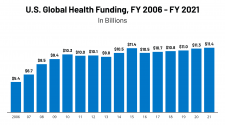A bipartisan panel of health experts will call on Tuesday for an overhaul of the American public health system that would greatly expand the role of the federal government, giving Washington the authority to set minimum health standards and coordinate a patchwork of nearly 3,000 state, local and tribal agencies.
The recommendations flow from what the panel, the Commonwealth Fund Commission on a National Public Health System, described as the inadequacies and inequities of the United States’ response to the coronavirus pandemic, which has killed more than one million Americans.
But in a report to be released on Tuesday, the panel said it also wanted to address the failures of the nation’s public health agencies to protect Americans from other health risks, including drug overdoses, diabetes and maternal mortality.
In recommending the creation of a new “national public health system,” the bipartisan panel, financed by the Commonwealth Fund, a nonprofit research group focused on health care issues, is dipping its toe in contentious political waters.
While other countries have centralized public health authorities, public health in the United States is largely managed at the state and local level. The Centers for Disease Control and Prevention, the federal public health agency, does not have the authority to compel states to act — it cannot, for example, investigate outbreaks of infectious disease in a particular state unless it has an invitation from state officials to do so.
State health agencies and the C.D.C. have a long history of working collaboratively, but throughout the pandemic, elected state officials — particularly those in red states — have been reluctant to cede control. When the C.D.C. asked states to sign agreements to share vaccination data with the federal government, for example, a number of states balked.
In its report, the panel cited “archaic approaches to aggregating data” as one reason so many Americans have died. It called on Congress to give the Department of Health and Human Services authority to establish and enforce standards for data collection.
Dr. Julie L. Gerberding, a member of the panel, who served as C.D.C. director in President George W. Bush’s administration, said the pandemic had “taught us that we have to have a coordinated, integrated public health network that functions — and the only way that we can bring that together is by having a national approach.”
The panel’s report comes as Congress is considering legislation that takes a different approach to shoring up the nation’s public health infrastructure. The Senate health committee has passed a bipartisan measure that would require the C.D.C. director to be confirmed by the Senate, and that calls for additional steps to improve coordination among the nation’s public health agencies.
The commission’s recommendations are more sweeping. The panel, led by Dr. Margaret A. Hamburg, the commissioner of the Food and Drug Administration under President Barack Obama, calls for the creation of a new position — Under Secretary for Public Health — within the Department of Health and Human Services, to oversee the national public health system.
The under secretary would coordinate the work of more than a dozen federal agencies that play a role in public health, and would have the power to set minimum health standards for the states.
“Our system of public health is a federalist system with states and localities having considerable autonomy — and appropriately so, as they adapt to the needs of their states and communities,” Dr. Hamburg said in an interview. “However, the public health protections that individuals receive shouldn’t be wholly dependent on where you live. There should be a core set of expectations.”
















